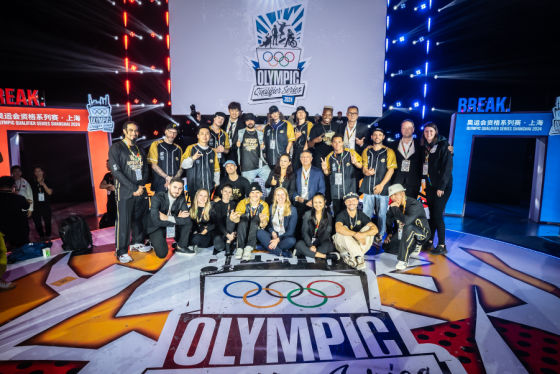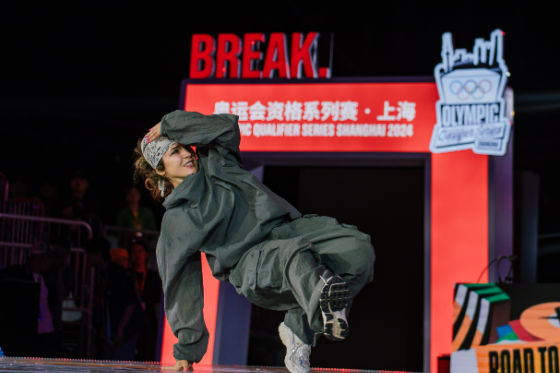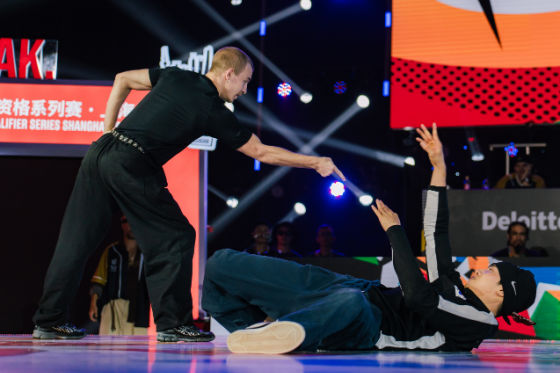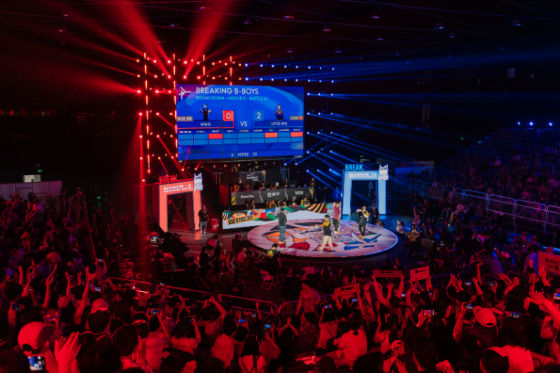Breaking is making a dynamic debut at the Paris Olympics this month and De Montfort University Leicester (DMU) graduate Alan Chi has played a key role in the preparations.

The WDSF team with breaking athletes at Shanghai Olympic qualifier series
The popular street dance style - rooted in hip-hop culture and characterised by acrobatic movements and the key roles of the DJ and MC during battles - was added to the 2024 Olympic programme as a new sport, following its warm reception at the 2018 Summer Youth Olympic Games in Buenos Aires.
Working as a Communications Officer in the breaking division of the World DanceSport Federation (WDSF), a role he landed just two months after graduating from DMU’s Sport Management MSc, Alan has been helping to prepare breakers from around the world to compete on the Olympic stage.

The 31-year-old from Taiwan said: “I was really lucky to get this opportunity, especially so soon after finishing my master’s. I still cannot believe I’m part of this journey, some people can only dream about being at the Olympics.
“I’m working very closely with my boss, who has been breaking for more than 20 years. He is very experienced in this community and I’m using my own sports knowledge to help us take breaking from a culture to a sporting event.”
Alan has been able to apply to his role the knowledge of the international sport system he gained on his master’s at DMU, which included a wide range of modules addressing subjects such as the Olympic movement, affiliated international federations, events and marketing.
His role at WDSF has involved working with breaking communities worldwide to develop a new rule book, judging system and regulations fit for the Olympics.

It has also involved attending the Olympic qualifier series, that started in Shanghai in May and ended in Budapest in June, determining which breaking athletes qualified for Paris 2024.
“Despite all the travelling and the challenges, it’s been very rewarding being involved in this Olympic movement,” Alan said.
“The breakers we support are really happy for this fantastic opportunity, which could lead to valuable sponsorship and business deals for them. Until now, breaking used to take place on the street, but we have the chance to change its reputation and challenge the stereotypes.
“We’ve also worked really hard to make sure that breaking is showcased and celebrated as part of the hip hop culture, even on the Olympic stage. That’s something we’re very proud of and the community has viewed positively too.”

As a former football player for Taiwan’s national team and a lifelong lover of sports, Alan first came to the UK on a working holiday visa just before the Covid-19 pandemic.
He said: “After completing my national military service and working as a sales consultant for an online learning company, I wanted to improve my English and experience watching some premier league football.
“Going to those football matches made me realise I still loved the vibe and environment. I thought that if I can’t be a professional football player anymore, I can still contribute something in sport.”
Two years after coming to the UK, Alan decided to explore his higher education options, and was drawn to DMU’s Sport Management MSc due to its practical nature.
He particularly valued the work experience he gained, including events-focused fieldwork at the Morningside Arena (now Mattioli Arena) – home to the Leicester Riders basketball team – and a marketing challenge organised by the Leicester Tigers rugby team.
“The real-world experience I gained during my master’s was very valuable,” said Alan. “It helped me to get to where I am today and I’m really happy with my decision to study at DMU.”
Dr Heather Dichter, DMU’s Sport Management MSc programme leader, said: “Gaining experience in the sport industry is an important part of the course. Sport organisations come into the classroom and challenge the students to develop creative solutions to the current issues confronting them.
“Many also offer great opportunities for the students through the fieldwork module, during which students spend more than three months gaining hands-on experience directly with a sport organisation or business.
“The sport industry is incredibly competitive, but these experiences help our students secure jobs after graduation. We are always thrilled to hear from students about the jobs they accept. In Alan’s case, what an exciting opportunity to help a sport make its Olympic debut.”
Posted on Thursday 18 July 2024